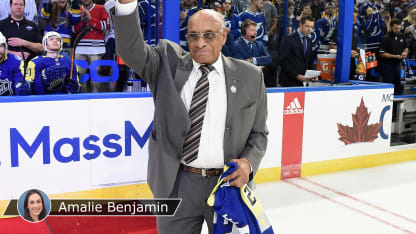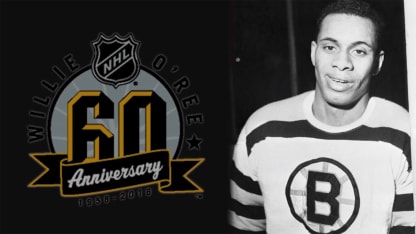When friends and acquaintances would suggest that perhaps Willie O'Ree deserved a place in the Hockey Hall of Fame, O'Ree would demur. He had played 45 games, with four goals and 10 assists, and that wasn't enough for inclusion, even with his historic status as the first black player in the NHL.
O'Ree's 'second calling' gets him elected to Hockey Hall of Fame
First black NHL player has worked tirelessly into his 80s to promote inclusion in sport

But as the years went on, as O'Ree was hired by the NHL as director of youth development and ambassador for NHL diversity in January 1998, he would let his mind wander. He would wonder if it might truly be possible for him to be included.
It happened Tuesday, when the Hockey Hall of Fame Class of 2018 was announced. O'Ree will be inducted into the Hall of Fame, in the builders category with NHL Commissioner Gary Bettman, on Nov. 12.
RELATED: [O'Ree inspiration to Simmonds as pioneer, hockey ambassador | Brodeur, O'Ree, Bettman lead Hockey Hall of Fame Class of 2018]
He was overwhelmed, having spent the morning pacing and waiting, pacing and waiting.
"When I got the call this morning from John Davidson and Lanny McDonald, I was thrilled," O'Ree said of the chairman of the selection committee and the chairman of the Hockey Hall of Fame. "I was crying in one part of me and laughing in another part. What a great honor. I just can't explain how I felt at that initial time that I got the call."
Hours later, while on the phone with NHL.com, O'Ree said he had felt the news settle in, digesting the fact that he would join the all-time hockey greats, and that his work as a groundbreaker and as a symbol of inclusion would be honored. He only regretted that his parents weren't alive to see it happen.
But that was the only blip in a day of excitement and happiness and joy, a day when hockey was able to celebrate O'Ree for the changes he brought to the game and the advancements he made and the people who would never have played if not for him.
"There are a select few about whom it can truly be said: 'He changed the game.' Willie O'Ree is among that select few," Bettman said in a statement.
That change is there, every night in the NHL.
"If it wasn't for Mr. O'Ree, I wouldn't be in the League today. You wouldn't have all these other ethnicities in the game today," said Philadelphia Flyers forward Wayne Simmonds, who is black. "The League would be all white.
"He makes you … feel that this game is all-encompassing. It allows people to think this is something that they want to do, and more kids are going to start trying to play the game and make it to the NHL and it's going to change the makeup of the NHL. I think that's a beautiful thing."
It was a story that began 70 years ago, when O'Ree grew up as a hockey-mad kid in Fredricton, New Brunswick. He began to dream of playing professionally, even of the NHL, at 14 years old, after coaches told him he might have the talent, if not the complexion.
Because, as they told him, there had never been a black player in the NHL.
There wouldn't be, until him.
He broke the barrier Jan. 18, 1958, when the Boston Bruins called him up for a home-and-home against the Montreal Canadiens, starting with a game at the Montreal Forum. But even O'Ree didn't then realize how momentous that game was, that he was doing something that not one player had done before.
He read of his feat in the newspaper, the next day.
But it was not just that game, or the 44 in the NHL that followed it, that brought him to be voted into the Hall of Fame. That came from the hundreds and thousands of children he has touched in the years since he finally took off the skates for the final time after 21 years of playing the game professionally, in the 39 local grassroots hockey programs he has helped establish.
Because even now, at 82 years old, O'Ree logs airline miles and hotel room nights that would make a much younger man wilt. Seemingly inexhaustible and eternally cheerful, O'Ree addresses kids of all stripes at rinks around the country, bringing his message of diversity and inclusion and pride to a generation well beyond the ones that saw the barriers broken by him and, in Major League Baseball, by Jackie Robinson.
"Willie is a pioneer and tremendous ambassador for the game of hockey," Bruins president Cam Neely said in a statement. "The courage he showed 60 years ago when he broke the League's color barrier while wearing a Bruins sweater is an inspiration, and his work today continues to grow the game of hockey and spread the message that hockey is for everyone."
It was a message -- and an honor -- that was especially resonant for the black players in the NHL today, and other black athletes, many of whom congratulated O'Ree through social media.
"I can't explain how happy I am to hear that," Nashville Predators defenseman P.K. Subban said in a video message posted to Twitter. "When I look back on my career and all my accomplishments, to think that none of it would ever be possible without the sacrifices that Willie O'Ree made and many, many others before me. … Without you, Willie, none of it would be possible. So congratulations."
Donovan Bailey, a sprinter who won a gold medal for Canada at the 1996 Atlanta Olympics, tweeted, "So happy to see Willie O'Ree on this [Hall of Fame] list. He's a reason so many of us had the opportunity to participate and excel in sport."
They have watched what he has meant to their own career, to their own opportunities, and they have watched what he has meant to kids younger than them. To the next generation, the future generations that will, if O'Ree gets his way, continue to expand the diversity of the NHL.
"For me, it's a joy watching him get into the Hockey Hall of Fame," Simmonds said. "He's done so much for the sport. Whether it be helping kids, black kids, kids of every ethnicity, realize their dreams. It's a great thing for our game.
"Willie travels around the country all year long, every year. He's such a selfless person. He feels at home doing that. He's given his life to the NHL. For the Hockey Hall of Fame to recognize the job that he's done, it's only right."

O'Ree will answer any question posed to him, on any topic, and he lights up as he does it, giving personal attention to young and old, black and white, hockey player and those who cannot skate. He loves telling his story, his experience, loves when players love hockey, and accepts it when they don't, making sure to tell them to find what they love.
It's something that Simmonds sees every time he encounters O'Ree, the joy, as O'Ree gets to do something that he referred to as "my second calling."
"I think being inducted in the Hall of Fame just opens the door for just thousands of kids, kids of colors, white kids, brown kids, green kids," O'Ree said. "It gives them the opportunity to be able to play the sport if they want to. We're just opening up the doors and saying, 'Here, you can play a sport where you never had the opportunity to play before.'"
It's that idea that resonates with Simmonds, the idea that O'Ree made his life, his career possible. Just as he made it possible for so many others.
"Willie paved the path for the rest of us," Hockey Hall of Fame goalie Grant Fuhr said in a statement. "In that way he is a true builder of the game. If you look up the word 'builder' there should be a picture of Willie. He is the Jackie Robinson of hockey."

















